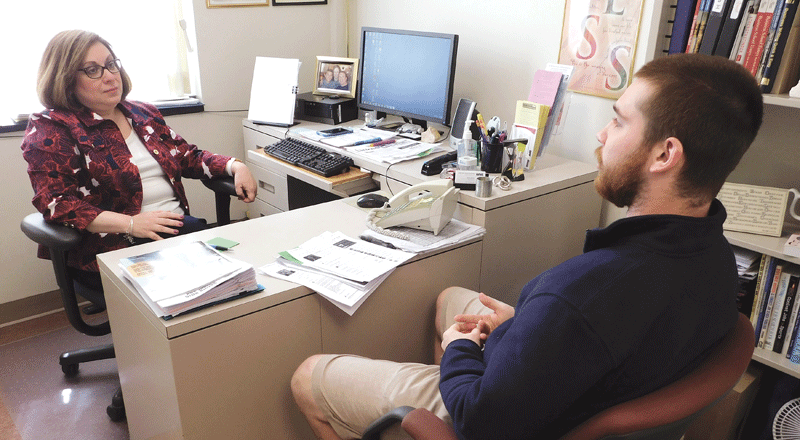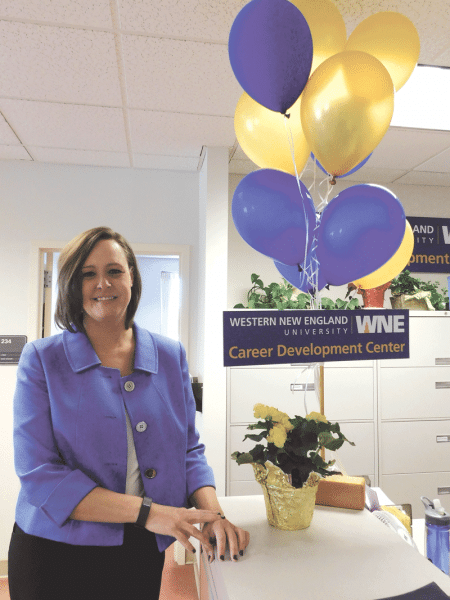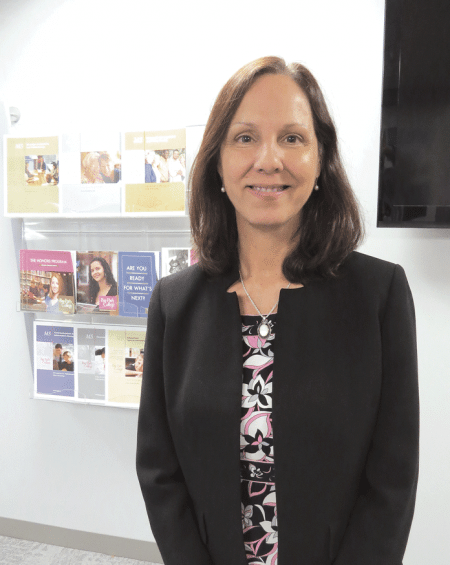
College Graduates to Find a Fertile Job Market, If…
Hire Education
By SARAH LEETE TSITSO

Maria Cokotis, assistant director of Career Development for the College of Business at Western New England University, helps Michael Jednak, a senior finance major, prepare for a job opportunity at a company in Boston.
Within weeks, the job market will be flooded with newly minted college graduates clutching both diplomas and dreams of the perfect job — or at least a solid opportunity with which to begin their chosen career.
Andrea St. James, director of the Career Development Center at Western New England University, said most young professionals will fare well in their pursuits given the current economic climate — particularly those who have completed their degrees in subject areas where there is high demand for trained, qualified candidates.
And that description certainly pertains to sectors including information technology, computer science, information management, accounting, actuarial science, and business analytics.
Candice Serafino, interim director of UMass Amherst Central Career Services, agrees that many of the technical majors are seeing high rates of employment upon graduation. For some students at UMass, job offers have been coming for several months now.
“There is high demand for all of the STEM [science, technology, engineering, and math] majors,” said Serafino. “For many of these jobs, firms are recruiting students in the fall semester. These students are faring quite well, and already have their jobs lined up well before graduation. Employers are looking for the analytical and problem-solving skills these students possess.”
The ability to creatively solve problems is a common theme for this year’s graduating seniors, with career counselors crediting this skill with their success in the job market.

Andrea St. James says career-services professionals and students need to have frank, honest conversations about which jobs are hot — and which are not.
“Employers are finding that this cohort of students is filled with lifelong learners who use their critical-thinking skills to approach problem solving,” said Serafino. “Our students are looking at problems from a big-picture perspective, communicating at a high level, and working as part of a team to achieve results. They are motivated, hardworking, upwardly mobile, and resourceful. All of this makes them very appealing to employers.”
St. James agrees, noting that the 2016 graduates are comfortable sharing their opinions, are willing to take calculated risks, and have a desire to work for innovative entrepreneurs.
“Employers are going to see young professionals who are hungry to gain experience while, at the same time, making a difference in their communities,” she said. “They are a creative bunch who are ready to add value to organizations across the board.”
Laurie Cirillo, executive director of career and life planning at Bay Path University, told BusinesWest she believes this generation is sometimes “misunderstood,” with some employers believing these young professionals want high salaries and accolades without putting in the requisite work.
“That’s just not true,” she said. “The work ethic is there — when employers are able to find what motivates them. My experience with this generation is that they are pushing hard to excel and achieve. They take risks and are not afraid to try something new. Employers can catch this wave and cultivate some pretty extraordinary talent.”
Entrepreneurial thinking is a skill many of these young professionals have cultivated, which means more are looking for outside-the-box opportunities when it comes to employment.
“We’re seeing students who want to create their own machine instead of being a cog in someone else’s,” said Serafino. “Students are interested in innovative startups and niche jobs.”
Finding Their Niche
When it comes to niche professions, Cirillo noted that providing new, cutting-edge majors is critical for students’ long-term success.
She said areas like healthcare and information technology are booming, with high levels of job placement for graduates. Total enrollment at Bay Path has grown 42% since 2011, with 100% growth in graduate programs since 2001, primarily in Occupational Therapy, Physician Assistant, Clinical Mental Health Counseling and Accounting.
She added that 96% of the 2015 graduates from the university’s traditional-student programs are employed, enrolled in graduate school, or both. She also noted that the state’s unemployment rate for March was 4.4%, well below local and national average, another benefit for job seekers. Overall, she attributes the success of Bay Path graduates to strategic decisions to offer programs and majors that reflect hiring trends and needs within the workforce.
“We build our programs and majors around where we see job growth,” Cirillo said, citing Bay Path’s new cyber security major as just one example.

Laurie Cirillo says she believes the current generation of students is largely “misunderstood” by employers.
Serafino said UMass takes the same approach. This year, the university noted an increase in employer interest in its life-sciences programs, so it held a career fair specifically for those students and prospective employers. “It was hugely successful, and we plan to expand on it next year.”
But if some fields are at various levels of ‘hot,’ others are cooling off, having reached a saturation point in today’s competitive job market. St. James said she’s seen a “leveling off” in law, education, communications, and marketing, for example.
And such trends warrant frank discussions between career-services professionals and students pursuing degrees in those fields, she went on.
“When we have students pursuing a major where we’re noticing a market saturation or fewer potential jobs, we’re poised to have an honest conversation with them, advising them to look at different opportunities where they can still utilize their skills and be successful,” said St. James. “In these cases, students need to look at what else they can do to diversify and translate their skills [into a career]. We want them to be ready when the economy shifts or new innovations change the marketplace.”
Serafino agrees that jobs in certain creative fields are experiencing a slowdown. However, she notes that technology and other innovations have shifted the demand to new niches. For example, the need for social-media professionals is opening up a whole new area of career opportunities for graduates.
Degrees of Success
Another challenge many college graduates are facing is the need for advanced degrees. Having a bachelor’s degree is often required, but in many industries it is becoming just as important to have a master’s or other advanced degree.
“You can still get a position in your field, but if you want to move up, master’s degrees are becoming the new bachelor’s degree,” said St. James. “We are also seeing an increased need for certificates and advanced study for certain professions, which is creating a niche market for specific areas of expertise.”
At Bay Path, where some of the most popular majors are science-based, advanced degrees are a necessity. Areas of study with high rates of students seeking advanced degrees include occupational therapy, physician assistant, accounting, clinical and mental-health services, and education (special education in particular).
Click HERE for a list of Western Mass. Employment Agencies
Even though some careers are now requiring a higher level of education, Serafino said she is still seeing many undergraduates who are able to secure great jobs. The question is, how are they doing it?
All three career-services professionals agree that there are several ways graduating students can get a leg up on their competition in the open market.
The first is by connecting early and often with career counselors. This includes attending job fairs, being paired with mentors who have experience in the student’s chosen field, and job-shadowing opportunities.
St. James noted that Western New England University is part of the College Career Centers of Western Massachusetts, along with American International College, Bay Path University, Holyoke Community College, Elms College, Westfield State University, Springfield College, and Springfield Technical Community College. Together, this collaborative recently hosted a career fair that helped cross-promote the colleges while also providing a one-stop shop for prospective employers.
“Hosting a career fair that is open to eight colleges really allows businesses to see the breadth and depth of the candidates we have here in Western Mass.,” said St. James. “We had a number of large employers in attendance who really got a chance to see a range of candidates from a wide variety of majors and schools.”
Serafino said UMass also hosted a number of job fairs this year, bringing more than 500 employers to that campus.
In terms of providing students with the information and guidance they need to prepare for the workforce, St. James said it is important to have career counselors with real-world experience in a specific industry.
“Our career counselors need to be able to connect students with professionals in the industry so those students can have real conversations and experiences with innovators who are working in the trenches,” she said.
Cirillo said career exploration is built directly into the curriculum at Bay Path, from the student’s first year until they complete their course of study.
“We want every student to have a plan for the future before they cross that stage on graduation day,” she said. “We spend four or more years preparing them to make connections, continuously think about and modify their education and life plan, and take the steps they need to be empowered and successful in whatever career they have chosen.”
Second, internships are more crucial than ever. Bay Path University requires internships for nearly all of its undergraduate students, for example.
Cirillo said studies have shown that employers are more likely to hire a candidate if he or she has a grade point average above 3.0 and has experience in the field. Internships provide that experience and, for many prospective employees, enable them to make connections within their industry that can lead to permanent positions. Internships help students feel confident in their chosen career path, as well as provide them with experience that often translates into higher starting salaries.
At Western New England University, students are eligible for an academic internship in their junior year. St. James noted that some majors require an internship, while others do not. That said, St. James said her career counselors always recommend internships, whether or not the student receives course credit for the experience.
“For most students, they have never done any real work in that career field,” she said. “Internships help students determine if they really want to do such work and if that career is right for them. Experiencing it first-hand, as early as possible, either reaffirms their career choice or enables them to redirect their efforts.
“When our students take that first step into the workforce, it can be a scary experience, especially if they have no knowledge or realistic expectations about work in the field,” she went on. “That can make the transition into the workforce much more difficult.”
Serafino said internships are a win/win proposition, often ensuring that talented young professionals stay in the area. She noted that employers like hiring students who have interned with their company, because those interns have a better understanding of that organization’s needs and culture.
At UMass, Serafino said a recent survey showed that close to 65% of seniors in the class of 2015 participated in some type of experiental learning, whether it was a formal internship, community-service opportunity, or job shadowing.
Cirillo also noted that internships can keep talent local.
“Employers who offer internship opportunities are cultivating their own pipeline,” she said. “It helps keep talent here in our region.
Balancing Act
As students celebrate their graduation, they are also experiencing anxiety.
Debt is front of mind for many, and so is the desire for that elusive work/life balance. As St. James noted, students want to work for companies that are socially responsible and that offer opportunities for employees to volunteer in the community. Some students want to wear a suit every day, but some don’t.
This duality is challenging for employers looking to attract and retain young talent. One commonality is a desire for mentors, and the development of strong relationships among co-workers.
“Those relationships are important to this generation of employees,” said St. James. “They need to like and value their jobs and the people around them. For them, it’s about more than a paycheck. It’s about forming relationships that have value, making a difference, progressing within their chosen field, and building a strong network. That’s what our students are looking for as they enter the job market.”






